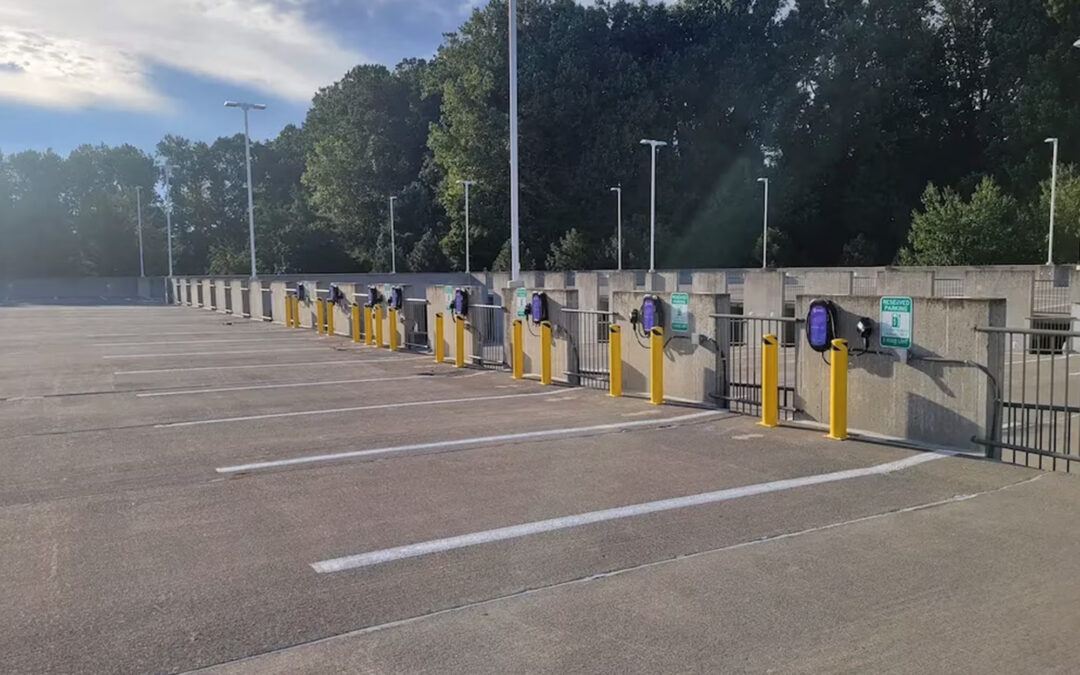Sustainability has become more than just a trend—it’s a priority for businesses today. Companies are under pressure to reduce their environmental impact, and adopting electric vehicle (EV) fleets is one way to meet those expectations. Beyond helping the planet, EV fleets can improve operations, build a stronger brand, and keep businesses ready for future regulations.
Switching to an electric fleet might seem like a big step, but it can offer significant rewards. Let’s break down how electric fleets help businesses align with sustainability goals while opening new opportunities.
The Environmental Benefits of Electric Fleets
The most noticeable benefit of electric fleets is their positive impact on the environment. Replacing traditional internal combustion engine (ICE) vehicles with EVs reduces greenhouse gas (GHG) emissions, improves air quality, and supports larger climate goals.
Cutting Greenhouse Gas Emissions
Electric vehicles don’t produce tailpipe emissions, making them much cleaner than gas or diesel-powered vehicles. This is especially important for industries like delivery, transportation, and logistics that rely heavily on vehicle fleets. For businesses aiming to achieve a net-zero carbon footprint, EVs offer an effective solution.
As the energy grid becomes cleaner through renewable energy sources like wind and solar, the overall environmental benefits of EVs continue to grow. States like Texas, a leader in wind energy, make it even easier for businesses to operate greener fleets.
Improved Air Quality and Public Health
Electric fleets also improve air quality by reducing GHG emissions and eliminating harmful pollutants like nitrogen oxides and particulate matter. Poor air quality can harm public health, particularly in cities and urban areas where fleet operations are concentrated. Insufficient air quality has been linked to respiratory and cardiovascular health issues, so by adopting EV fleets, businesses contribute to healthier communities and show their commitment to social responsibility.
Support for Corporate Sustainability Programs
Many companies set goals to reduce energy use, cut emissions, and minimize waste. and reduce energy use. Electric fleets can play a big part in meeting those goals. With fleet management software that’s built into the EV charging infrastructure to track emissions and energy use, businesses can measure their progress and report on their environmental efforts.
Meeting Regulations and Staying Ahead
Governments worldwide are introducing stricter environmental rules and rewarding the adoption of clean technology in their fleet operations. Transitioning to electric fleets helps businesses comply with these regulations and avoid fines while staying ahead of the curve. Here’s how:
Focusing on Regulatory Compliance
From federal laws like the Clean Air Act in the United States to state-level mandates such as California’s Advanced Clean Trucks rule, environmental regulations are increasingly targeting fleet operators. Transitioning to an electric fleet guarantees compliance with current and future legislation, protecting companies from costly non-compliance penalties down the road.
Incentives for EV Adoption
Governments and utility companies offer financial support to businesses that decide to adopt EVs. These incentives include tax credits, grants, and rebates that can offset the costs of switching to electric fleets, making it financially viable. Programs like the National Electric Vehicle Infrastructure (NEVI) funding in the U.S. also provide support for building charging infrastructure, reducing the financial burden.
Taking advantage of these programs allows businesses to lead in sustainability while gaining long-term savings and strengthening their reputation.
Economic Advantages of Electric Fleets
Adopting an electric fleet isn’t just good for the environment—it makes financial sense. Electric vehicles offer a lower total cost of ownership (TC) compared to ICE vehicles, thanks to reduced fuel and maintenance expenses.
Savings on Fuel and Maintenance
Electricity is significantly cheaper than gasoline or diesel, especially when vehicles can be charged during off-peak hours. EVs also have fewer moving parts, reducing the need for routine maintenance such as oil changes, engine repairs, and brake replacements. For fleet operators managing dozens or hundreds of vehicles, these savings add up quickly.
Boosting Efficiency and Uptime
Modern EV fleets benefit from advanced telematics and fleet management systems that optimize routes, monitor battery health, and predict maintenance needs. This proactive approach reduces downtime and makes sure that vehicles are always available when needed. Enhanced efficiency translates into better service delivery and lower operational costs—benefits that directly impact a company’s bottom line.
The future is electric! Find out how EV charging infrastructure is turning cities like Houston into cleaner, greener, and more sustainable places to live.
Building a Sustainable Brand
Before spending their money, consumers are paying attention to how businesses handle sustainability. Adopting electric fleets can help businesses build a reputation for being environmentally responsible, which can attract more customers and improve relationships with stakeholders.
Improving Public Image
Companies with visible sustainability initiatives, such as a fleet of branded EVs, can improve their public image and foster customer loyalty. These efforts resonate particularly well with younger, eco-conscious demographics who are more likely to advocate for brands that align with their values.
Standing Out From the Competition
Sustainability can set a business apart in a crowded market. Businesses that adopt electric fleets early gain a head start in building their green credentials, setting themselves apart from competitors who may still rely on traditional fleets. This advantage is especially significant in industries like logistics, where clients increasingly demand sustainable practices from their service providers.
Employee Pride and Retention
A company’s sustainability efforts can also boost employee morale. Workers, especially from younger generations, want to work for businesses that care about the environment. Transitioning to an electric fleet shows that your business is forward-thinking and committed to making a positive impact.
How to Overcome Challenges in Electric Fleet Adoption
While the benefits of electric fleets are clear, businesses may face challenges during the transition. However, these obstacles are manageable with careful planning and the right support.
Initial Investment Costs
The upfront cost of purchasing EVs and installing charging infrastructure can be a barrier for some businesses. However, government incentives, financing options, and long-term cost savings make the expenses of the switch more affordable. Partnering with experienced providers, such as Lonestar Integrated Solutions, can further streamline the process by offering tailored solutions and guidance on funding opportunities.
Charging Infrastructure
Developing a reliable EV charging network is essential for fleet operations. Businesses must consider factors such as site location, charging capacity, and energy management. Advanced technologies like smart charging systems and renewable energy integration can optimize charging efficiency and reduce costs.
Range Limitations
While modern EVs offer significant range improvements, businesses with long-haul operations may still have concerns about range limitations. Fleet managers can address this by strategically planning routes and incorporating fast-charging solutions to ensure minimal disruption to operations.
How Lonestar Integrated Solutions Can Help
Transitioning to an electric fleet may seem overwhelming, but you don’t have to navigate it alone. We specialize in designing, installing, and managing EV fleet solutions tailored to your needs. From building charging infrastructure to navigating funding programs, our team helps businesses transition smoothly and cost-effectively.
Sustainability isn’t just about meeting targets—it’s about driving meaningful change for your business and the environment. Let us help you achieve your sustainability goals while enhancing efficiency, compliance, and brand reputation.
A Sustainable Future Starts Today
Adopting an electric fleet is a step toward a cleaner and more sustainable future. By reducing emissions, complying with regulations, and showcasing environmental leadership, businesses can position themselves as innovators and responsible corporate citizens.
Drive Your Business Toward Sustainability with Lonestar Integrated Solutions
Are you ready to take the next step toward a greener, more sustainable future? Contact Lonestar Integrated Solutions today to explore how our EV fleet solutions can transform your operations and align with your sustainability goals. Together, we can drive a cleaner, brighter future for your business and your community.

